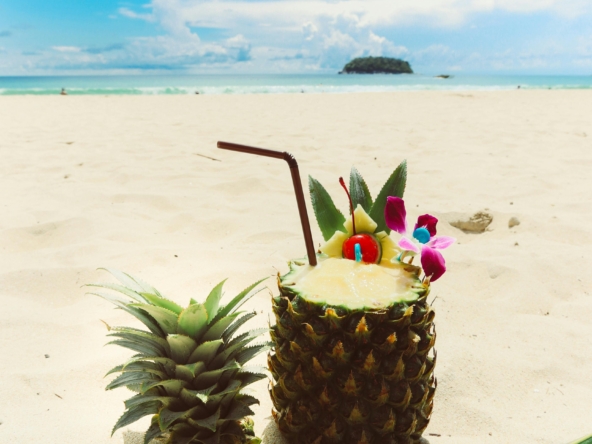A Spiritual and Culinary Journey Coming in October 2024
As October approaches, Thailand prepares for one of its most vibrant and culturally rich celebrations—the Vegetarian Festival, also known as the Tesagan Gin Je or the Nine Emperor Gods Festival. This unique event is not just a celebration of food but a deeply spiritual and ritualistic festival rooted in Chinese-Thai communities, where devotion, purification, and a commitment to non-violence converge. In 2024, the festival will take place from October 2 to October 11, drawing both locals and travelers into an unforgettable experience of culinary delights and mystical traditions.
The Origins of the Vegetarian Festival
The origins of the Vegetarian Festival date back to the 19th century when Chinese immigrants brought their Taoist beliefs to Thailand. According to legend, the festival began when a Chinese opera troupe in Phuket fell ill. To recover, they adopted a vegetarian diet and performed rituals to honor the Nine Emperor Gods. Miraculously, they recovered, and ever since, the festival has been celebrated annually, particularly in southern Thailand, though it has spread across the country.
The Spirit Behind the Festival
The Vegetarian Festival is much more than abstaining from meat. It is a period of spiritual cleansing, where participants follow a strict vegan diet to purify their bodies and minds. During the festival, believers avoid not only animal products but also pungent ingredients such as garlic, onions, and certain herbs, which are thought to cloud the mind and affect spiritual clarity.
Participants also adhere to specific rules to enhance their spiritual merit, such as wearing white clothes to symbolize purity, refraining from alcohol, and practicing celibacy. For those involved in the deeper rituals, the festival is a time to demonstrate devotion to the Nine Emperor Gods through prayer, meditation, and sometimes extreme acts of religious observance.
Sacred Rituals and Ceremonies
One of the most fascinating aspects of the Vegetarian Festival is the ma song—a group of devotees believed to be possessed by deities. These individuals perform acts of self-mortification, such as walking on hot coals, piercing their skin with sharp objects, or climbing ladders made of blades. Despite the pain and bloodshed, these devotees are said to feel little to no pain, as they are in a trance-like state, channeling divine protection.
While these rituals may be shocking for onlookers, they are rooted in ancient Taoist beliefs of cleansing the community of bad luck, misfortune, and illness. Phuket, in particular, becomes a focal point for these intense displays of devotion, drawing thousands of visitors annually.
A Vegetarian Food Lover’s Paradise
For many, the highlight of the Vegetarian Festival is the food. Street vendors, markets, and restaurants across the country transform their menus to offer an array of vegetarian and vegan dishes. From mock meats and tofu-based creations to fresh vegetable curries and stir-fries, the variety of flavors and textures is astounding. Popular dishes include pad Thai with tofu, vegan tom yum soup, and je som tum (a vegetarian version of the famous papaya salad).
In the bustling streets of Bangkok, Phuket, Chiang Mai, and other cities, food stalls marked with yellow flags signal that they are serving festival-approved vegetarian food. These dishes are prepared without animal products or pungent seasonings, making them not only delicious but also in line with the festival’s principles of purity.
Where to Experience the Festival
While the Vegetarian Festival is celebrated nationwide, some areas stand out for their grand scale and elaborate rituals. Phuket is the epicenter of the festival, with its famous processions, fire-walking, and ma song performances. The island comes alive with the sights and sounds of fireworks, gongs, and vibrant parades featuring people in white, temple mediums, and intricate floats.
In Bangkok, Chinatown (Yaowarat) becomes a bustling hub of food stalls and offerings to the gods. Temples across the capital, such as Wat Mangkon Kamalawat, hold ceremonies and prayers, allowing visitors to witness the spiritual aspect of the festival firsthand.
For a quieter, more intimate experience, the northern city of Chiang Mai offers a more laid-back version of the festival, focusing on food and temple rituals without the extreme processions seen in Phuket.
Tips for Visitors
Dress Respectfully: Since the festival has deep religious significance, it is important to dress modestly, especially if attending rituals at temples. White clothing is preferred as a symbol of purity.
Follow Festival Etiquette: If you are participating in the festival, be mindful of the rules regarding the vegetarian diet and behavior during the period. Avoid bringing non-vegetarian food into festival areas.
Prepare for Crowds: Popular locations such as Phuket and Bangkok can get crowded, especially during the processions. Arrive early to secure a good spot and be prepared for a lively, bustling atmosphere.
Respect Local Customs: The self-mortification rituals are a deeply spiritual practice for the devotees. If you are watching, do so with respect and avoid disrupting the participants or the flow of the ceremony.
Conclusion
The Vegetarian Festival in Thailand is a one-of-a-kind event that seamlessly blends spirituality, devotion, and culinary exploration. Whether you’re drawn to the festival for its vibrant street food or its mesmerizing rituals, visiting Thailand during this time offers a unique glimpse into the cultural richness and spiritual depth of the country.




